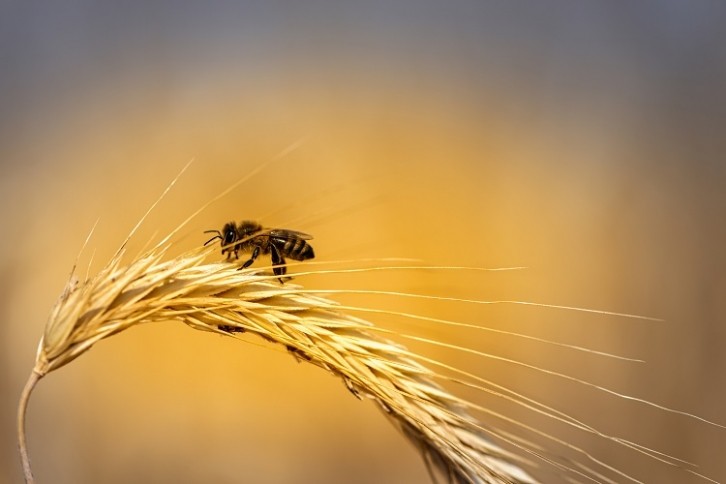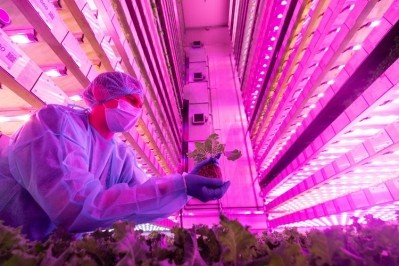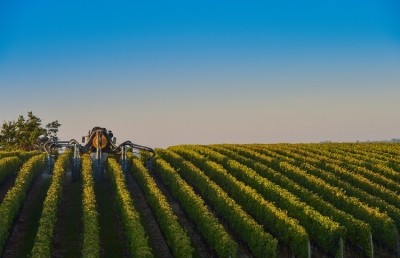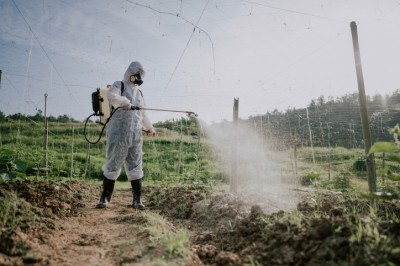Bee study reveals environmental vulnerability and food production threat

A study carried out by scientists at the University of Lausanne, published in Nature Microbiology, has revealed that bees produce nutrients, which aid in the colonisation of their gut bacteria, highlighting a symbiotic host-microbiota relationship and offering insights into bees’ environmental weaknesses.
Why are gut bacteria important?
Gut bacteria play an important role for their host. They provide energy by degrading indigestible food, they train and regulate the immune system, they protect against invasion by pathogenic bacteria and they synthesise neuroactive molecules that regulate the behaviour and cognition of their host.
How was the study conducted?
Scientists began by looking for evidence that the gut bacteria of bees share nutrients with one another when bees are fed nothing other than sugar water. Initial results showed that one specific bacterium in the gut, Snodgrassella alvi, which cannot metabolise sugar to grow, still colonised the bee gut when no other bacteria were present. This raised the question of how Snodgrassella alvi were obtaining their nutrients.
By measuring metabolites in the gut, the scientists discovered that the bee synthesises multiple acids, including citric, malic and 3-hydroxy-3-methylglutaric, which are exported into the gut and found to be less abundant when S. alvi was present. These results led them to pose an unexpected hypothesis, ‘does the bee directly enable S. alvi to colonise its gut by furnishing the necessary nutrients?’.
In order to prove this hypothesis, the University of Lausanne scientists approached the laboratory of Professor Anders Meibom (affiliated with UNIL and EPFL). Professor Meibom and his team measured the flux of metabolites in complex environments at nanometer scale resolution, using Nanoscale Secondary Ion Mass Spectrometry (NanoSIMS). Together the two teams devised an experiment in which microbiota-free bees received a special diet of glucose, where the natural 12C atoms of carbon in the glucose were replaced with the naturally rare 13C ‘labelled’ isotopes. The bees were then colonised with S. alvi. The final stage involved the fixed guts embarking on a journey, first passing by the electron microscopy facility of UNIL, led by Senior Lecturer Christel Genoud, then onto the laboratory of Professor Meibom and his NanoSIMS.
The scientists were able to construct a two-dimensional image of the 13C atoms in the gut of the bee, which showed that the S. alvi cells were significantly enriched in 13C, which reflected the 13C enrichment of the acids present in the gut.
“We have strong evidence that other bacterial species native to the bee gut profit from host-derived compounds. In our paper we note that species of the genus Gilliamella can also utilise some of these compounds. Re-analysis of our prior work also indicates that multiple lactobacillus species utilise what we now know to be host-derived citric acid, said research scientist Andrew Quinn.
“However, unlike with S. alvi, we don't have a clear picture of how much these additional bacteria profit from this exchange, as they primarily consume sugars found in the bee diet. Now that we understand which metabolites in the bee gut are synthesised by the host, we and others in the field will be alert for evidence that native microbes utilise them.”
What do these results tell us about the impact of the environment on bees?
“We know that a healthy microbiota is important for bee health. They protect against pathogens, help break down nutrients in the diet, and they produce beneficial neuroactive compounds that aid the bees’ cognitive function. We also know that stresses like newly emerging pathogens and pesticides have been linked to dysbiosis in the bee gut. A lot of attention has focused on how bees change their foraging habits, but no one has closely looked at how these stresses could alter the bees’ metabolism, and how that in turn impacts the gut microbiota,” said Quinn.
“We have uncovered a tight metabolic link between bees and their microbes. Bees metabolise sugars in their diet and convert them into organic acids that are exported into the gut, where the native microbiota uses them for energy. This metabolic linkage between the host and its microbes may explain why bees have such a distinct, specific, and stable microbiome. Future work in this area may prove crucial in reevaluating the impact of stressors on bees, as many exert subtly detrimental effects that ultimately damage bee colonies over the long term or make them just a bit more susceptible to pathogens that can destroy the colony.”
"Pollinators, including bees, are vital for the survival of wild plants, which in turn support so much of our wildlife. They are also hugely important for pollinating our food crops, responsible for every third mouthful we eat. Sadly, three bumblebee species have become extinct in recent decades and the recent European Red List for Bees reports that almost one in ten species of wild bee now faces extinction."
Why are bees so vital to the planet and how could their declining numbers impact food production?
As well as being important, in their own right, bees are our greatest pollinators. According to the Woodland Trust, around 70 crops depend on or benefit from bee pollination in the UK alone. While there are other methods of pollination, including by other animals and the wind, wild bees can pollinate on a much bigger and more efficient scale. “Estimates suggest it would cost UK farmers an incredible £1.8bn (€2.1bn) a year to manually pollinate their crops.
“Without bees, and thousands of other insect species, it would not be long before our ecosystem collapsed. Bees pollinate our wild trees and wildflowers, which then support other insects, which then support birds, bats, mammals and everything up the food chain, with food and shelter.
“Bees are also responsible for pollinating many of the crops used for animal feed, meaning that they help to support the production of meat, egg and dairy products.”
Research scientist Quinn added, “we echo the warnings of conservationists, ecologists, and pollinator health experts that pollinators, including bees, are under threat from myriad factors, including climate change, intensive agriculture practices, the emergence of novel pathogens, and pesticide usage. Honeybees receive the lion’s share of attention because we are so familiar with them, and because of their economic value.
“However, concern for bee health should really be focused on wild bee species who are suffering far more than managed honeybees. Any efforts to better protect against these stressors would be welcomed.”
The bacterial genus Snodgrassella studied is also found in many species of honeybees, stingless bees, and bumblebees.
“We found that species of Snodgrassella native to bumblebees also feed on host-derived compounds when transplanted into the gut of honeybees, but further research is needed to confirm these findings in other bee species. We in the midst of comprehensive experiments to identify the interactions between pesticides and the entire bee gut microbiota and then understand how those interactions affect bee health,” explained Quinn.
“Pollinators, including bees, are vital for the survival of wild plants, which in turn support so much of our wildlife. They are also hugely important for pollinating our food crops, responsible for every third mouthful we eat. Sadly, three bumblebee species have become extinct in recent decades and the recent European Red List for Bees reports that almost one in ten species of wild bee now faces extinction,” said a spokesperson for The Wildlife Trusts, which is currently spearheading a campaign to ‘back nature-friendly beet farmers’.
Approved in 2020, one of the key priorities of the European Commission’s Green Deal is to protect biodiversity and ecosystems.
Source: Host-derived organic acids enable gut colonization of the honey bee symbiont Snodgrassella alvi
Published online: 15 January 2024
DOI: https://www.nature.com/articles/s41564-023-01572-y
Authors: Andrew Quinn, Yassine El Chazli, Stéphane Escrig, Jean Daraspe, Nicolas Neuschwander, Aoife McNally, Christel Genoud, Anders Meibom, Philipp Engel
























